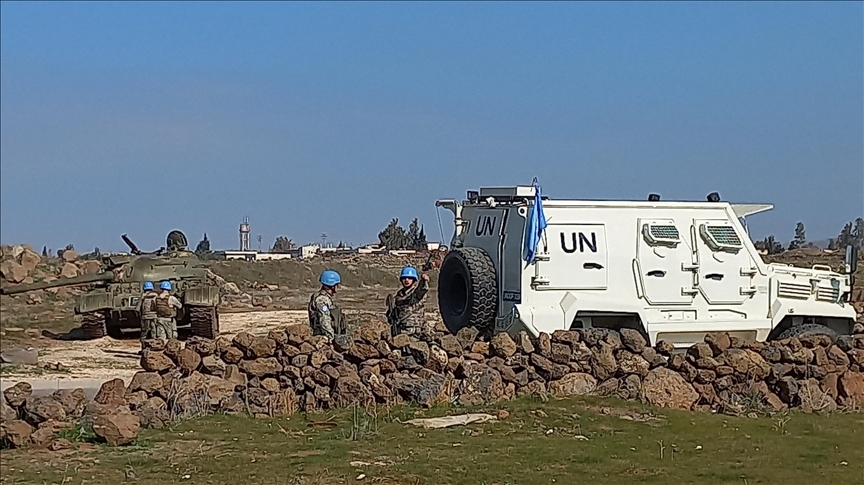OPINION - Peacekeeping in retreat: The implications of a 25% UN force cut on global stability
Prospects for the resuscitation of UN peacekeeping missions are fading as multilateralism grows increasingly irrelevant, an antithesis to the UN's core norms, standards, and principles
 United Nations (UN) conducts mine-sweeping activities in Golan Heights after overthrow of the 61-year Baath regime and 53-year rule of the Assad family in Quneitra Governorate, Syria on January 29, 2025.
United Nations (UN) conducts mine-sweeping activities in Golan Heights after overthrow of the 61-year Baath regime and 53-year rule of the Assad family in Quneitra Governorate, Syria on January 29, 2025.
- When UN peacekeeping retreats, the credibility of global institutionalism is eroded. Conflict resolution has unfortunately shifted to a bilateral and coercive endeavor which endangers world peace
The author is a visiting fellow at the Stimson Center, a foreign policy think tank in Washington, DC.
ISTANBUL
Institutionalism, multilateralism, and collaborative solutions for world peace, as well as joint mechanisms for conflict resolution, are diminishing globally. They are being replaced by polarization, unilateralism, and great power priorities. Nowhere is this more evident than in the reduced influence of UN peacekeeping missions. [1]
US budgetary constraints [2] amid a prolonged government shutdown [3] in Washington, caused by reckless political point-scoring by both Democrats and Republicans, have resulted in the United Nations announcing a 25% reduction [4] in its peacekeeping operations abroad. This means a cumulative withdrawal of over 13,000 military and civilian personnel [5] worldwide, affecting nine active missions --including South Sudan, the Israeli-occupied Golan Heights, the Central African Republic, and UNIFIL in Lebanon. The funding cuts are taking place due to domestic American populism, indicating a clear erosion of institutionalism and international norms, which threatens global stability.
Erosion of peace and security vacuums
The reasons are manifold. The 25% UN force cut needs to be analyzed by factoring in important variables. Firstly, some of the most tenuous conflict zones across the world include South Sudan and the Eastern Democratic Republic of Congo in Africa, where UN peacekeepers play a key role in providing humanitarian convoys [6] and deterring further provocations from groups such as M23. Undercutting such operations, which are already low on funding, [7] entails troubling reversals of limited progress achieved on a continent where tribal conflicts and variegated dynamics require the deployment of robust peacekeeping missions. Also, the reduced potency of peacekeeping missions in Africa entails the creation of security vacuums that local militias can exploit, resulting in further violence and crimes against humanity. Similarly, funding cuts for the UNIFIL in Lebanon [8] erode buffer zones and embolden Israel to carry out heinous crimes against the Lebanese people, particularly in the south of the country. Lack of adequate monitoring of the 2024 ceasefire [9] also risks giving Israel a free hand to attack Lebanon.
Glaring funding vacuums that jeopardize peace
The 25% UN cut comes with glaring funding vacuums that cannot be easily addressed and jeopardize global peace. The US is currently the UN's largest funder, constituting 27% of its peacekeeping budget. [10] Under the Trump administration however, the US will only pay half of its current contribution, amounting to only $682 million. [11] This not only jolts global peacekeeping but demonstrates how the UN’s functioning remains reliant on domestic constraints within the United States, which jeopardizes global, sustainable peace. Similarly, a lack of alternate funding dampens peacekeeping. While the EU can potentially fill the gap, member states are known for not doing enough, [12] preferring instead to partake in alliances [13] such as NATO for geopolitical objectives such as containing Russia. Also, regional unions such as West Africa’s ECOWAS, the African Union, and the Arab League lack the financial clout or accreditation to replace UN missions, and while China can step in fiscally and deploy more troops, resuscitating the UN depends on the budgetary priorities of Beijing, which is based on decisions taken at the annual Two Sessions [14]. Hence, prospects for the resuscitation of UN peacekeeping missions are fading as multilateralism becomes increasingly irrelevant, an antithesis to the UN's core norms, standards, and principles.
Erosion of the UN’s moral standing and institutional credibility
The UN's case spotlights how the credibility of global institutionalism remains at stake. Its peacekeeping missions across the globe for example, are regarded as apolitical and are impartial guarantors of security in conflict zones. However, an erosion of the UN's functioning, performance, and scope makes parties to conflicts in various countries question its status as a conflict manager. Such credibility gaps are accompanied by greater freedom for armed groups such as M23 in the Congo, to launch attacks on civilians [15] with impunity. This weakens the UN’s moral standing and its ancillary services, which are critical for regional security including intelligence gathering and real-time monitoring of ceasefires.
Variegated quagmires for the international community
The diminishing importance of international organizations such as the UN has a spiraling effect on territories beyond its mandated zones. Refugee inflows, arms proliferation, and illicit trade present complex policy challenges for governments, whereby the collapse of fragile states becomes imminent while relatively stable ones risk being burdened. Essentially, UN cuts result in indigenous populations being exposed to impending humanitarian crises. Domestic political costs are also high as UN missions play a key role in assisting local governments and communities in the provision of transitional justice. [16] However, their reduced functionality increases the likelihood of domestic unrest, which challenges prevailing status quos in Africa and beyond.
As a result, when UN peacekeeping retreats, the credibility of global institutionalism is eroded. Conflict resolution has unfortunately shifted to a bilateral and coercive endeavor which endangers world peace.
[1] https://www.reuters.com/world/un-slash-quarter-peacekeepers-globally-over-lack-cash-2025-10-08/
[2] https://www.channelnewsasia.com/world/un-peacekeeping-force-cut-25-budget-strains-5390911?
[3] https://www.bbc.com/news/articles/c4gp55kkk2wo
[4] https://www.channelnewsasia.com/world/un-peacekeeping-force-cut-25-budget-strains-5390911?
[5] https://www.reuters.com/world/un-slash-quarter-peacekeepers-globally-over-lack-cash-2025-10-08/
[6] https://www.trtafrika.com/english/article/9237d7bc321a
[7] https://issafrica.org/iss-today/africa-isnt-ready-for-a-withdrawal-of-peacekeepers?
[8] https://apnews.com/article/trump-united-nations-cuts-review-154e7b2756a08140c6fcecd6c38ce0f5
[9] https://www.crisisgroup.org/middle-east-north-africa/east-mediterranean-mena/lebanon-israelpalestine-united-states/reinforcing-shaky-israel-lebanon-ceasefire
[10] https://www.reuters.com/world/africa/us-peacekeeping-cuts-could-limit-un-ability-protect-civilians-says-un-2025-09-02/
[11] https://www.france24.com/en/americas/20251009-un-global-peacekeeping-us-funding
[12] https://www.ips-journal.eu/topics/foreign-and-security-policy/time-to-match-words-with-deeds-8239/
[13] https://www.theguardian.com/world/live/2025/oct/15/russia-ukraine-nato-france-latest-europe-live-news-updates
[14] https://english.www.gov.cn/news/202503/02/content_WS67c3f05bc6d0868f4e8f0369.htm
[15] https://www.reuters.com/world/africa/congo-m23-sign-deal-doha-ceasefire-monitoring-sources-say-2025-10-14/
[16] https://peacekeeping.un.org/en/important-step-forward-transitional-justice-enters-academy-of-justices-training-programme
*Opinions expressed in this article are the author's own and do not necessarily reflect Anadolu's editorial policy.








